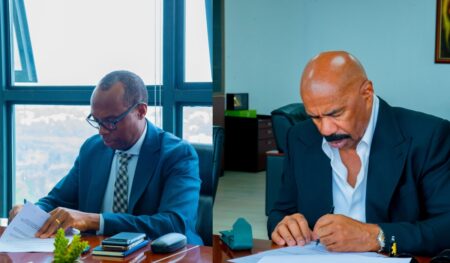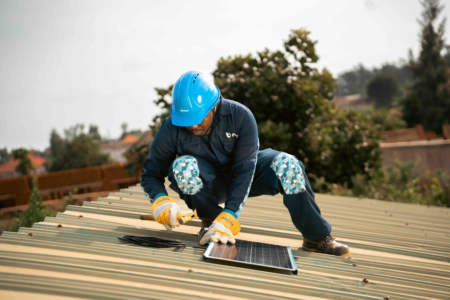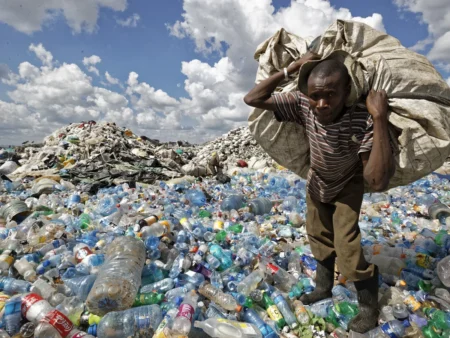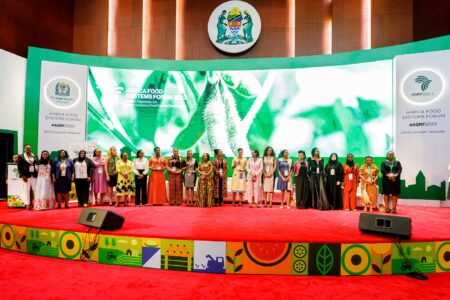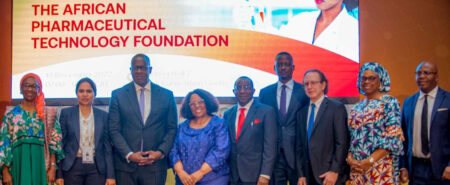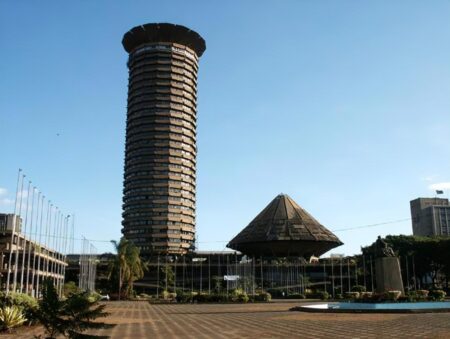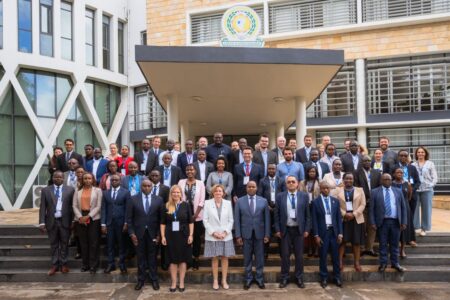- The silent struggle: Women entrepreneurs in Africa and the financial divide
- Questions and answers on confirmation of war crime charges against Joseph Kony at the ICC
- The critical need for energy access in Africa: A roadmap to prosperity
- Killings, abductions, cruel laws worsen East Africa’s human rights record
- Will the Kampala Declaration deliver for African farmers amid climate change?
- Investments in ports, ICT and agriculture key in landmark Kenya-UAE trade pact
- The Just Energy Transition in Africa: Lessons from South Africa and Senegal
- Mukuru Wallet poised to bolster financial inclusion in Zimbabwe
Browsing: Rwanda
- Rwanda signs investment pact with US comedian Steve Harvey joining a list of countries in Africa tapping Hollywood stars to promote tourism.
- New deal will establish an academic institution in Kigali.
- Steve Harvey to invest in education, health and film in Rwanda.
Tourism in Rwanda is growing and to help speed up the process, the country has signed a deal with a renowned famous American entertainer, Steve Harvey. The move is part of strategies being deployed by African couintries to uniquely market their tourism offering to the world. Kigali’s move follows similar steps taken by Tanzania, which signed a pact with Hollywood star Idris Elba to launch a film studio in Zanzibar, an archipelago in the East African nation.
In Rwanda, the deal was signed at the end of 2024 between the Rwanda Development Board (RDB) and BILT LLC, an American company owned by Steve Harvey. In a media …
- Rwanda is considering agro-processes to enhance its geothermal resources base.
- Africa’s geothermal investments are projected to reach $35 billion by 2050.
- By 2050, geothermal power capacity in Africa will more than double Europe’s capacity.
Rwanda geothermal energy offers the East African country a way to diversify its sources of electricity and reduce reliance on imported energy. According to official reports, Rwanda is aiming to add 30 megawatts of geothermal power to its electricity grid but it is also considering other uses of the energy resource, owing to the costs related to electricity generation using geothermal resources.
“We are focusing on developing direct heat utilization and continuing exploration for deeper resources to produce electricity in the future,” Eugene Karangwa, Head of Alternative Energies and Geothermal at Rwanda Energy Group (REG), announced recently. He said Rwanda is looking to utilize its geothermal resources directly for heating and drying, and not just electricity …
- Kenya solidifies its position as East Africa’s tourism hub, with Nairobi chosen to host the Africa Youth in Tourism Innovation Summit for 2025, 2026, and 2027.
- The summit, which draws hundreds of innovators, government leaders, and tourism experts, will boost Kenya’s post-COVID tourism recovery.
- Organized by TEAMS Africa, the event underscores Nairobi’s growing prominence on the global tourism stage following a successful edition in Namibia.
Kenya, East Africa’s travel and tourism industry hub, has yet again cemented its position in the hospitality sector after the capital Nairobi was picked to host the Africa Youth in Tourism Innovation Summit and Challenge (AYTIS) for the years 2025, 2026, and 2027.
This feat further reinforces Kenya as a tourism destination of choice as the industry continues to register growth post the Covid-19 economic fallout.
AYTIS is a platform that is fashioned to promote and uplift innovative investors within the dynamic tourism industry in …
- With its multiple technologies, Bboxx is trailblazing in the green energy space, scaling its operations across Africa and projecting to offset over 20 million tonnes of CO2.
- Bboxx has been awarded Gold Standard certification for carbon credit programs based on solar home systems, clean cooking alternatives, and solar-powered water pumps.
- Implementing carbon programs allows Bboxx to accelerate market growth potential by reaching over 4 million customers in five African countries.
Rwanda-based Bboxx plans to offset over 20 million tonnes of carbon and generate $100 million worth of carbon credits through clean energy projects in Africa.
In this initiative, Bboxx projects to positively impact the lives of over four million customers across Rwanda, Kenya, Nigeria, Togo, and the Democratic Republic of Congo (DRC).
These revelations follow Bboxx’s recognition with the Gold Standard certification for its continued rollout of clean energy projects in five African countries. This certification marks a vital moment …
- Guinea has announced a single-use plastic ban, signalling the growing momentum of the African plastic ban movement.
- Guinea prohibits the production, import, sale, and use of single-use plastics, including plastic bags and oxo-degradable plastics.
- The country now joins trailblazers Rwanda, Kenya and Somalia, who banned single-use plastics in their jurisdictions.
Africa is experiencing a vital environmental wave with the increasing rollout of tough measures on single-use plastics. With trailblazers Rwanda and Kenya having banned single-use plastics, Guinea has joined the elite club, announcing a sweeping ban on single-use plastic products and packaging.
Early this year, Somalia joined this movement, banning the use of single-use plastics beyond June 30, 2024. Authorities in the Horn of Africa country urged individuals and businesses to explore using environmentally friendly alternatives to meet their packaging needs.
This move by the West African country signals a historic moment for the continent's push to counter the…
- The Malabo Declaration deadline has expired with only a handful of African countries on track.
- Of 51 AU member states, only Rwanda is on course to achieving the 2014 Malabo commitments on financing agriculture.
- In year’s Africa Food Systems Forum in Kigali, authorities cited a myriad of challenges in achieving key goals.
Africa food systems are failing but there is still optimism. This is despite the fact that we are only one year away from the Malabo Declaration’s deadline and only six years to the end of the Sustainable Development Goals (SDGs).
In June 2014, the Malabo Declaration was made in Equatorial Guinea, where all African countries made a commitment to spend 10 per cent of their annual national budgets on agriculture.
“Only four countries achieved the Malabo target of allocating 10 percent of public spending to agriculture (Burundi, DR Congo, Ethiopia and Mali),” writes Moumini Savadogo for Farming First …
- The African pharmaceuticals market is projected to reach $34 billion by 2027.
- Egypt has been tipped to contribute most to Africa’s pharmaceutical industry’s growth.
- What implication does this change present to global pharmaceutical giants?
Africa pharmaceutical investment is well underway, and for the first time, the continent seeks to produce and distribute medicinal drugs but, what would be the impact on the global industry? “The failures of the global health systems during the COVID-19 pandemic—when export restrictions, lockdowns, and hoarding sent supply chains into frantic disarray—made local manufacturing of pharmaceutical supplies a top priority for African leaders,” notes global health writer Sara Jerving in her report titled New foundation is ready to help African pharmaceutical manufacturers.
Africa pharmaceuticals market reached $25 billion 2022 and is expected to grow at a 6 percent five-year CAGR to reach $34 billion by 2027 reports IQVIA, a global research institute. According to the …
- Key reforms ranging from privatisation initiatives in Kenya to financial liberalisation in Ethiopia, are positioning East Africa as a prime destination for PE investment.
- In Uganda, upcoming oil production in 2025 is expected to increase PE activity, particularly in sectors and businesses that will benefit indirectly from the oil industry.
- Tanzania’s one stop facilitation centre introduced in 2023 seeks to streamline the investment process by integrating key authorities that issue permits and approvals.
East Africa is experiencing a surge in private equity (PE) interest, driven by a wave of government reforms that are reshaping the financial industry. Kevin Kimotho, East Africa Private Equity Leader at Deloitte Africa, has highlighted these developments in the firm’s latest Deloitte Africa Private Equity Confidence Survey 2024.
These reforms, ranging from privatisation initiatives in Kenya to financial liberalisation in Ethiopia are positioning East Africa as a prime destination for PE investment.
Currently, Kenya continues …
- DRC is grappling with a severe outbreak of Mpox, reporting over 1,000 new cases in just one week.
- This alarming surge has prompted health authorities in Africa to urgently request vaccines to combat the viral infection.
- Kenya, the DRC, Burundi, Rwanda, and Uganda are set to benefit from a donation of 50,000 doses of mpox vaccine as part of a global effort to check spread.
The Democratic Republic of Congo (DRC) is grappling with a severe Mpox outbreak, reporting over 1,000 new cases in just one week. This alarming surge has prompted health authorities in Africa to urgently request vaccines to combat what is increasingly seen as a growing threat on the continent. As the Mpox outbreak escalates, the need for international support has become more critical than ever.
The growing threat of Mpox in Africa
Mpox, a viral disease belonging to the same family as smallpox, is spreading rapidly …
- The EAC’s distribution sector is marred by systemic challenges, despite claims of a working free trade zone in the bloc.
- Stakeholders say that persistent bottlenecks hamper the flow of goods and services across the eight-member area.
- A recent EU-led EAC Peer-to-Peer Learning Conference sought to formulate a strategic action plan to address barriers limiting the industry’s growth and development.
The East African Community (EAC) is an eight-country strong regional free trade bloc in East Africa, by definition, it should mean easier movement or distribution of goods and services, but that’s only true on paper, the reality on the ground is quite on the contrary.
EAC maintains that it is “dedicated to enhancing economic efficiency and fostering regional integration through strategic investments and the utilization of established industries. The goal is to position the Community as a single investment area, harmonizing trade policies, investment incentives, and product standards.”
Protocols demand that …





